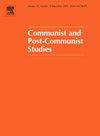卢卡申科的宪法公投与白俄罗斯社会的两极分化
IF 1.3
4区 社会学
Q3 INTERNATIONAL RELATIONS
引用次数: 1
摘要
作为对反对2020年总统选举官方结果的抗议的回应,亚历山大·卢卡申科推动了白俄罗斯宪法的全面改革。其目标是满足民众对变革的渴望,而不是对提前选举的要求作出反应。随着2022年2月的宪法公民投票,这是自1994年以来对白俄罗斯宪法进行的最广泛的修改,卢卡申科进一步巩固了自己的权力。我们的在线调查结果显示,修宪没有满足社会对政治变革的广泛需求,尤其是对限制总统权力的需求。尽管政治冲突持续存在,但我们也表明,卢卡申科的支持者和反对者在每个政策领域并非不可调和地两极分化。最后,我们的研究结果表明,当涉及到两个阵营的未来政治参与时,政权支持者比反对派支持者有更强的反民主偏好,使得情感两极分化的影响高度不对称。本文章由计算机程序翻译,如有差异,请以英文原文为准。
Lukashenka’s Constitutional Plebiscite and the Polarization of Belarusian Society
Aliaksandr Lukashenka pushed through an overhaul of Belarus’s constitution as a response to the protests against the official results of the 2020 presidential election. The goal was to address the desire for change among the population without reacting to the demand for snap elections. With the February 2022 constitutional plebiscite on the most far-ranging changes to Belarus’s constitution since 1994, Lukashenka further entrenched himself in power. The results of our online survey suggest that the constitutional changes do not meet the broad societal demand for political change and, in particular, for constraints on presidential power. Despite the persistence of the political conflict, we also show that Lukashenka’s supporters and opponents are not irreconcilably polarized in every policy domain. Finally, our results suggest that regime supporters have stronger anti-democratic preferences than opposition supporters when it comes to future political participation of the two camps, making the effects of affective polarization highly asymmetrical.
求助全文
通过发布文献求助,成功后即可免费获取论文全文。
去求助
来源期刊

Communist and Post-Communist Studies
Multiple-
CiteScore
1.90
自引率
0.00%
发文量
23
期刊介绍:
Communist and Post-Communist Studies is an international journal covering all communist and post-communist states and communist movements, including both their domestic policies and their international relations. It is focused on the analysis of historical as well as current developments in the communist and post-communist world, including ideology, economy and society. It also aims to provide comparative foci on a given subject by inviting comments of a comparative character from scholars specializing in the same subject matter but in different countries.
 求助内容:
求助内容: 应助结果提醒方式:
应助结果提醒方式:


